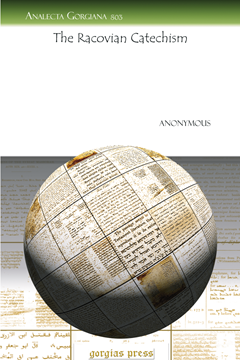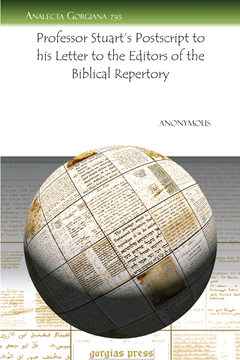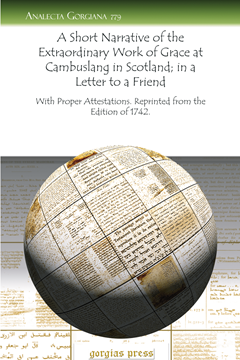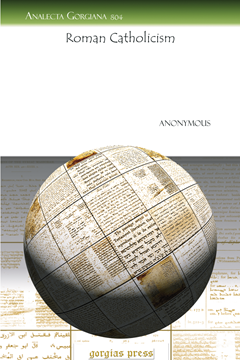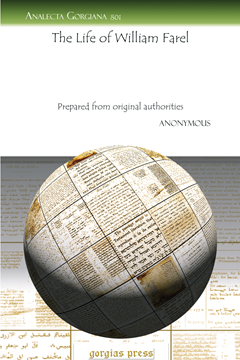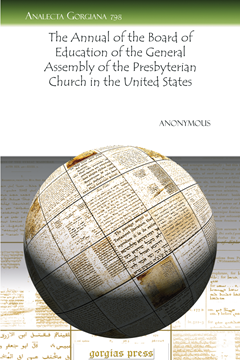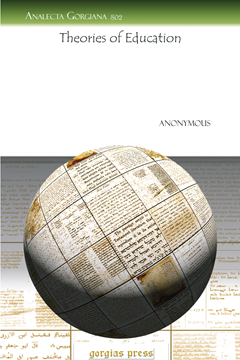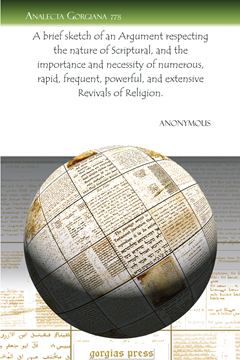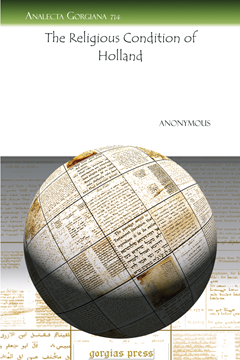Anonymous
An Apology for Conforming to the Protestant Episcopal Church
Contained in a series of Letters addressed to the Reverend Benjamin T. Onderdonk, D.D., Bishop of the Diocese of New York. By Thomas S. Brittan.
By Anonymous
Series: Analecta Gorgiana 808
ISBN: 978-1-61143-186-5
The article reviews a text by a convert from Presbyterianism to the Protestant Episcopal Church. The reviewer is critical of much of the evidence the author uses and declares the book to be poor in quality and unoriginal.
$36.00 (USD)
Quakerism not Christianity
Or Reasons for renouncing the doctrine of Friends. In three parts. By Samuel Hanson Cox, D.D., Pastor of the Laight Street Presbyterian Church; and for twenty years a member of the Society of Friends. Pp. 686.
By Anonymous
Series: Analecta Gorgiana 810
ISBN: 978-1-61143-188-9
The article reviews a book which is highly critical of Quakerism. The reviewer relates a brief history of Quakerism and proceeds to challenge Quaker doctrines. Quakerism is described as an incorrect form of Christianity.
$36.00 (USD)
The Racovian Catechism
By Anonymous
Series: Analecta Gorgiana 803
ISBN: 978-1-61143-181-0
The author provides the biography of Socianism founder Faustus Socinus. The article provides a partial translation of his posthumously compiled “Racovian Catechism” from the original Polish with the intention of revealing information about Socianism.
$36.00 (USD)
The Church Establishment of England
By Anonymous
Series: Analecta Gorgiana 792
ISBN: 978-1-61143-170-4
The author reviews a pamphlet that criticizes the connection between church and state in England. He attacks the bias inherent in the system, the inefficiency of it, and its inability to fulfill its churchly duties.
$36.00 (USD)
Professor Stuart’s Postscript to his Letter to the Editors of the Biblical Repertory
By Anonymous
Series: Analecta Gorgiana 793
ISBN: 978-1-61143-171-1
The article responds to a postscript from a letter to the editor on the journal’s position on loans by the American Education Society. The editor counters the writer’s claims and defends the journal’s prior position.
$36.00 (USD)
Memoir of Roger Williams, the Founder of the State of Rhode Island
By James D. Knowles, Professor of Pastoral Duties in the Newton Theological Institution. Boston: Lincoln, Edmands & Co. 1834. 12mo.
By Anonymous
Series: Analecta Gorgiana 788
ISBN: 978-1-61143-166-7
This article reviews a memoir of Roger Williams, founder of Rhode Island. The reviewer presents Williams’ biography, the founding of Providence and the creation of Rhode Island. Much attention is paid to the politics of its founding.
$36.00 (USD)
A Short Narrative of the Extraordinary Work of Grace at Cambuslang in Scotland; in a Letter to a Fri
With Proper Attestations. Reprinted from the Edition of 1742
Series: Analecta Gorgiana 779
ISBN: 978-1-61143-157-5
This article introduces and reprints a letter relating the extraordinary conversion of a large number of sinners in Cambuslang, Scotland. Following are a series of attestations to the truth of the account by various Scottish ministers.
$36.00 (USD)
The Life of the Rev. Rowland Hill, A. M.
By the Rev. Edwin Sidney, A. M. London, (printed.) New York, (reprinted,) 1834. 12mo.
By Anonymous
Series: Analecta Gorgiana 785
ISBN: 978-1-61143-163-6
The review reviews the life of Rev. Rowland Hill based on his published biography. Included is the minutia of his preaching career. Though a review, the article comments little on the text, more or less paraphrasing it.
$36.00 (USD)
The Case of the Dissenters in a Letter Addressed to the Lord Chancellor
By Anonymous
Series: Analecta Gorgiana 786
ISBN: 978-1-61143-164-3
The article is a letter concerning the treatment of Dissenters in England. The writer objects to the nationalized Episcopacy for various injustices upon Dissenters. He asks for separation of church and state.
$36.00 (USD)
The Sinner’s Ability to obey God, if he will
Two Sermons by Rev. Mr. Perkins, Montreal, Canada. National Preacher, September, 1833. J.& J. Harper, New York.
By Anonymous
Series: Analecta Gorgiana 782
ISBN: 978-1-61143-160-5
The article reviews two sermons on the freedom of sinners to obey God. The author declares that man can obey so long as he is able, stating the reverend’s point is obvious and flawed.
$35.00 (USD)
Cornelius Jansenius; and the Controversies on Grace, in the Roman Catholic Church
By Anonymous
Series: Analecta Gorgiana 789
ISBN: 978-1-61143-167-4
The author provides the biography of Cornelius Jansenius and describes his commentary, Augustinus, to explain Jansenius’s position on Grace in relation to Catholic doctrine. He concludes this history convicts the Catholic Church.
$35.00 (USD)
Roman Catholicism
By Anonymous
Series: Analecta Gorgiana 804
ISBN: 978-1-61143-182-7
A scathing polemic against Roman Catholicism, the author uses logical and textual evidence to contradict Catholic rituals and beliefs.
$35.00 (USD)
Memoir of the Rev. George Burder, author of “Village Sermons,” and Secretary of the London Missionar
By Henry Foster Burder, DD
By Anonymous
Series: Analecta Gorgiana 811
ISBN: 978-1-61143-189-6
The article reviews the memoir of Rev. George Burder. The reviewer outlines the reverend’s family, his entrance to the ministry, his shift into missionary work, his preaching, and his hardships. The reviewer judges his style and persona.
$35.00 (USD)
Remarks on the Epistles of Ignatius
By Anonymous
Series: Analecta Gorgiana 814
ISBN: 978-1-61143-192-6
The article describes and critiques the authenticity of the epistles of Ignatius. The author claims that the illegitimacy of letters that speak of prelacy erodes the basis for Episcopacy and Presbyterianism.
$35.00 (USD)
The Life of William Farel
Prepared from original authorities
By Anonymous
Series: Analecta Gorgiana 801
ISBN: 978-1-61143-179-7
The reviewer examines a biography of Protestant Reformer William Farel. The book describes Farel’s departure from Catholicism and contributions to the efforts of Swiss Reformation, Zuingle in particular. His trails and successes are described.
$35.00 (USD)
The Annual of the Board of Education of the General Assembly of the Presbyterian Church in the Unite
By Anonymous
Series: Analecta Gorgiana 798
ISBN: 978-1-61143-176-6
The reviewer praises an annual, comprised of a series of articles, as valuable for students entering the ministry. The author advocates modesty, hard work and piety amongst other virtues.
$35.00 (USD)
Theories of Education
By Anonymous
Series: Analecta Gorgiana 802
ISBN: 978-1-61143-180-3
The author attacks practices common in newer forms of education. He generally calls for a more conservative, less experimental, approach which emphasizes deep general knowledge. No formal method is offered to replace the broken system.
$34.00 (USD)
Wolf’s Anti-Homeric Theory, as applied to the Pentateuch
By Anonymous
Series: Analecta Gorgiana 790
ISBN: 978-1-61143-168-1
The article rejects the argument that the Bible was not solely penned by Moses. He examines the evidence and presents his own to oppose it. He concludes that neither side of the argument can be proven.
$34.00 (USD)
The Act and Testimony
By Anonymous
Series: Analecta Gorgiana 791
ISBN: 978-1-61143-169-8
The article criticizes the Presbyterian Church’s recent Act and Testimony. The author claims it is excessive, leaving no room for interpretation, and is dangerously schismatic. It would divide the Church for no reason.
$34.00 (USD)
Tholuck’s Interpretation of the Sermon on the Mount
By Anonymous
Series: Analecta Gorgiana 783
ISBN: 978-1-61143-161-2
The article reviews a commentary on the Sermon on the Mount. The reviewer examines the conclusions reached by the author as well as the method used to come to those conclusions. He approves of the author’s unique philosophical approach.
$34.00 (USD)
Bodily Affections produced by Religious Excitement
By Anonymous
Series: Analecta Gorgiana 784
ISBN: 978-1-61143-162-9
The article is a response to an unprinted letter concerning involuntary body movement during moments of religious frenzy. The editor relates personal experience from 1800 to 1803 and ultimately discourages this behavior.
$34.00 (USD)
An address delivered before the Alumni Association of Nassau Hall, on the date of the Annual Commenc
By Anonymous
Series: Analecta Gorgiana 780
ISBN: 978-1-61143-158-2
The article comments on and reprints passages from a commencement speech for the Alumni Association of Nassau Hall. In the address, John Sergeant discusses why not many students are inadequately prepared for college work.
$34.00 (USD)
A Brief Account of the Chaldee Targums
From the Latin of Leusden
By Anonymous
Series: Analecta Gorgiana 781
ISBN: 978-1-61143-159-9
The author describes the Chaldee Targums, recommending them to readers such that they can use the Targums to convert Jews who use them as evidence for their own religion. The author also analyses several Targums.
$34.00 (USD)
A brief sketch of an Argument respecting the nature of Scriptural, and the importance and necessity
By Anonymous
Series: Analecta Gorgiana 778
ISBN: 978-1-61143-156-8
The author advocates spiritual revivals. He describes the proper revival and says why America in particular stands to benefit from more revivals. He also warns of the negative consequences if there are too few revivals.
$34.00 (USD)
The Religious Condition of Holland
By Anonymous
Series: Analecta Gorgiana 714
ISBN: 978-1-61143-006-6
The author outlines religious practices and history of Protestant Churches in Holland. Most attention is paid to the Reformed Church of Holland, but other Churches are discussed. The influence of politics and important figureheads is described.
$34.00 (USD)



